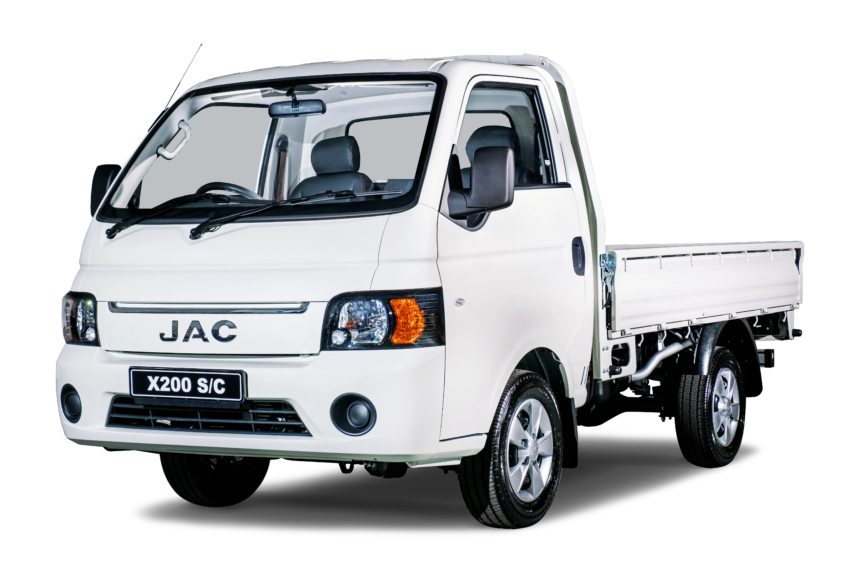JAC Motors is in the process of adding ABS (Anti-lock Braking System) to its popular X200 2.8L TDI 1.5-tonne single-cab, enhancing safety for both crew and cargo. This latest upgrade complements the ABS-equipped X200 1.3-tonne double-cab targeted at organisations with labour-intensive crews.
JAC Motors’ dealer network covers over 70 locations across southern Africa, including Namibia, Botswana, Zambia, Eswatini, Malawi, Zimbabwe, and Mozambique. This extensive reach ensures the brand’s after-sales service meets global brand standards.
The JAC X-Series includes two 1.5-tonne single-cab and two 1.3-tonne double-cab derivatives. The X200 double-cab offers seating for six people, an unmatched product offering in the local market. The X-Series is powered by a 2.8-litre four-cylinder direct-injection, inter-cooled, turbo-diesel engine, with customers being able to choose between 68 kW or 80 kW derivatives.
The X200 offers large disc brakes in front supported by drum brakes at the back to ensure excellent stopping power. However, today, ABS has become an essential feature for light commercial vehicles navigating Africa’s demanding, potholed roads and challenging weather conditions. With ABS now standard across the X-Series, drivers gain superior stability during hard braking for increased safety.
“We are thrilled to now also offer ABS on our X200 single-cabs, a crucial feature for today’s challenging road conditions. We are proud to be the only brand in the country that provides ABS as a standard feature on forward-cab bakkies, leading the way in safe transportation practices,” says Karl-Heinz Göbel, CEO of JAC Motors South Africa.
The X-Series features 68 kW/210 Nm and 80 kW/240 Nm turbo-diesel derivatives. Both options ensure excellent fuel economy, delivering maximum torque at low RPM to reduce gear changes, conserve fuel, and enhance overall efficiency for diverse applications. The average fuel consumption of the X200 is 8.0 ℓ/100 km (combined cycle). It supports a tow mass (braked) of 1,250 kg.
“A local online car publication, in direct comparisons with Korean rivals, found the X200 outperformed competitors in price, performance, fuel consumption, payload and service plan. It was commended as the forward-cab workhorse with the lowest running costs in its class,” said Göbel.
A forward-cab design is more practical than a standard bakkie. Its main benefit is the increased load box size, which results in much larger load volumes. The X200 single-cab’s load box measures almost 2.8 metres and supports a large load area of 4,595 mm². Its cargo area of 2,785 mm (length) x 1,650 mm (width), coupled with 355 mm high drop-sides, is designed for optimal space utilisation. Its maximum permitted payload of 1,500 kg is the largest in the forward-cab market.
The X200 double-cab’s maximum payload of 1 300kg matches its single-cab rivals. Despite the space being used to fit three more people inside the extended cab, the X200 double-cab supports a large load area of 3 654 mm². The cargo area of 2 215 mm (length) x 1 650 mm (width) and 355 mm high drop-sides can still accommodate heavy and bulky loads.
The X200’s double-wishbone independent front suspension and robust ladder-frame chassis ensure durability across various body applications. This setup enhances stability, manoeuvrability and handling, regardless of payload size. Maximised axle capacity for optimal weight distribution keeps drivers, passengers, and cargo safe on the road, regardless of body configuration or challenging road conditions.
Göbel emphasised that safety is a top priority for JAC Motors and expressed confidence that entrepreneurs and transport operators will appreciate the addition of ABS on forward-cab workhorses. “The X-Series is the only forward-cab workhorse with ABS in the local market, setting a new safety standard among competitors.”
“We aim to make a difference in road safety, aware of the lives, time, and resources lost to transport accidents. By prioritising driver and cargo safety, we strive to help entrepreneurs and fleet operators contribute to safer roads across Southern Africa,” added Göbel.



